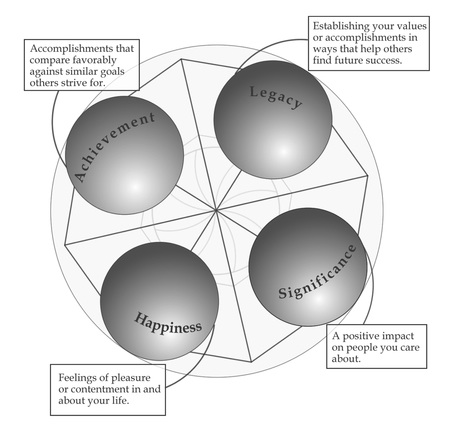Are You Making The Most Out Of Life? Here’s How You Can.
.
When Does “More” Finally Become “Enough”?
You probably have far more now than you ever had in the past but you’re probably not much happier.
And, instinctively, we think the problem can still be fixed by more. More of whatever.
More money. More food. More things. Generically, more.
We’re not even sure what we need more of, but whatever we have now sure as hell isn’t doing it so turn it up to 11, Bertha.
This isn’t an anti-capitalist rant or your grandfather saying you kids don’t appreciate anything.
It’s another example of our instincts gone awry. So what’s the problem here?
Two researchers figured it out.
“Am I making the most out of my life?”
In their book Just Enough, Howard Stevenson and Laura Nash wanted an answer to the question we all ask ourselves:
“Am I making the most out of my life?“
The question wasn’t “What makes me feel good?” There’s no shortage of that.
The problem is that in the quest for “What makes me feel good” there’s no finish line. It’s a pie eating contest and first prize is more pie.
What combination of things makes us feel we have enough? What kills the need for more?
What, in this world of infinite perpetually screaming options, makes us lean back from the table and calmly say, “I’m good, thanks”?
So they studied really successful people. They did more than 60 interviews with very high achieving professionals.
Turns out most of those people didn’t know the answer either.
But what was interesting was that they made consistent mistakes.
And by looking at these mistakes the researchers were able to get a handle on what we need in life and the best way to go about it.
Mistake 1: You Can’t Use Just One Yardstick
We all know the good life means more than just money… but none of us is exactly sure what those other things are or how to get them.
Let’s face it: Money’s pretty easy to count and it consistently brings some happiness for at least a short period of time.
We all know love and friends and other stuff is important too…
But they’re a heck of a lot more complicated and you can’t just have them delivered to your house by Amazon Prime. So inconvenient.
But evaluating life by one metric turned out to be a key problem. In Just Enough they refer to it as a “collapsing strategy.”
Collapsing everything into one barometer of whether or not your life is on track.
Most of us find it easy to just focus on money and say “make the number go up.” It’s like a video game.
Convenient, simple and dead wrong.
The problem isn’t that money is a terrible metric, the problem is there’s more than one metric that matters.
Via Just Enough: Tools for Creating Success in Your Work and Life:
Enduring success isn’t about one set of values, it’s about knowing how to apply values to multiple goals.
And we see this in our lives. A lot of people these days talk about FOMO: Fear Of Missing Out.
Even insanely successful people felt they were missing out in another area of life.
Via Just Enough: Tools for Creating Success in Your Work and Life:
Jim Warner’s study of 200 CEOs primarily drawn from the high-achieving Young Presidents Organization, revealed that 70 percent reported feeling “driven” to achieve financial independence and 60 percent felt ready for a life change for negative reasons: They felt they were losing out on something else.
Studying is good… but so is time with friends. When we try and collapse everything into one metric we inevitably get frustrated.
The researchers realized multiple yardsticks for life were necessary.
For instance, to have a good relationship with your family you need to spend time with them. So hours spent together is one way to measure.
But if that time is spent screaming at each other, that’s not good either. So you need to measure quantity and quality.
What metrics matter for a good life? The study came up with four.
Via Just Enough: Tools for Creating Success in Your Work and Life:
- 1. Happiness: Feelings of pleasure or contentment in and about your life.
- 2. Achievement: Accomplishments that compare favorably against similar goals others have strived for.
- 3. Significance: A positive impact on people you care about.
- 4. Legacy: Establishing your values or accomplishments in ways that help others find future success.

Just reading this list, it makes intuitive sense.
We all know people who succeed at number one… but eventually feel like losers because they ignored number 2. And vice versa.
Interestingly, some of those interviewed seemed aware of the four categories and did not try to condense them into a single bucket.
But they made another error: they figured they could handle them one at a time. Turns out that doesn’t work either.
Mistake #2: You Cannot Put The Good Life On Hold
“First I’ll work a job I hate and make a lot of money and THEN I’ll have a family and THEN I’ll do what I want and be happy.”
This is what Just Enough refers to as the “sequential strategy.”
Via Just Enough: Tools for Creating Success in Your Work and Life:
Sequential strategies methodically take the idea of delayed gratification to an extreme. It’s the pattern of choice for many young people today, especially the so-called dot-comers who saw promises of fast riches just down the road.
Clay Christensen wisely addresses this problem in his powerful book, How Will You Measure Your Life?:
The relationships you have with family and close friends are going to be the most important sources of happiness in your life. But you have to be careful. When it seems like everything at home is going well, you will be lulled into believing that you can put your investments in these relationships onto the back burner. That would be an enormous mistake. By the time serious problems arise in those relationships, it often is too late to repair them. This means, almost paradoxically, that the time when it is most important to invest in building strong families and close friendships is when it appears, at the surface, as if it’s not necessary.
And nowhere is this more true than with children.
Via How Will You Measure Your Life?:
One of the most common versions of this mistake that high-potential young professionals make is believing that investments in life can be sequenced. The logic is, for example, “I can invest in my career during the early years when our children are small and parenting isn’t as critical. When our children are a bit older and begin to be interested in things that adults are interested in, then I can lift my foot off my career accelerator. That’s when I’ll focus on my family.” Guess what. By that time the game is already over. An investment in a child needs to have been made long before then, to provide him with the tools he needs to survive life’s challenges— even earlier than you might realize.
But does this theory hold up to scrutiny? It’s very hard to scientifically analyze the results but some informal proof came from talking to retirees.
Turns out the happiest older folks had balanced their lives across the four categories.
Via Just Enough: Tools for Creating Success in Your Work and Life:
We learned this lesson most clearly from some of our interviewees who had experienced retirement. Those who’d saved up all their life for this moment of pleasure by never experiencing happiness had no idea what to do with themselves. They only had achievement skills. They had no community, and few social skills beyond those that could be bought with a corporate title. They often drove their spouses crazy. On the other hand, those who tried to keep up their former pace and make one more grand killing in the marketplace often found themselves not quite so satisfied about going to work, taking on the next problem. They feared that they may have lost their fast ball. Those who seemed most balanced in retirement had invested healthy doses of activity in all four categories over their lifetime.
We see more and more examples of overcommitment to one area and neglect of the others. The brilliant computer programmer with zero social skills.
The hard-charging businesswoman who waits too long to have kids. The career-climbing man who doesn’t spend any time with the kids he has.
We excel by focusing our effort, as with deliberate practice.
But the danger is that we become one dimensional — an efficient machine designed to do only one thing.
So that porridge was too hot, and that porridge was too cold. Which one is just right?
Success Is A Lifetime Process
In Just Enough, Stevenson and Nash call the good strategy “spiraling and linking.”
You cycle through the four needs on a regular, if not daily, basis.
If you ignore any of them you’re headed for a “collapsing” strategy and if you delay, you’re in “sequential” territory.
I’ve been experimenting with this. Frankly, it’s a pain in the ass because I’m wired to pick one thing and destroy everything in my path to get to it.
But I am happier. The Good Life is a balance, and must be, because there isn’t a finish line. This was one of their findings:
Via Just Enough: Tools for Creating Success in Your Work and Life:
If you think, like many people today, that success is about delaying happiness while you achieve, and that the final point of success should be to put aside all effort and lead a happy life, you are unlikely to achieve real success or happiness. All scientific research shows that happiness has a fading quality: the first taste of the hot fudge sundae is terrific, but if you ate four of them, you would find little pleasure. You have to renew happiness on a regular basis, not look for some state of unending pleasure.
The comedian Steven Wright once quipped:
I took my dog for a walk, all the way from New York to Florida. I said to him “There, now you’re done.”
Very funny. It doesn’t work for dogs and it doesn’t work for us either.
Aim for a bit of the four each day:
Via Just Enough: Tools for Creating Success in Your Work and Life:
- 1. Happiness: Feelings of pleasure or contentment in and about your life.
- 2. Achievement: Accomplishments that compare favorably against similar goals others have strived for.
- 3. Significance: A positive impact on people you care about.
- 4. Legacy: Establishing your values or accomplishments in ways that help others find future success.
Measuring life by one yardstick won’t work. And moving through the four sequentially is a mistake too.
A favorite quote of mine by Warren Buffett sums it up:
I always worry about people who say, “I’m going to do this for ten years; I really don’t like it very well. And then I’ll do this…” That’s a lot like saving sex up for your old age. Not a very good idea.
Join 45K+ readers. Get a free weekly update via email here.
Related posts:
What 10 things should you do every day to improve your life?




